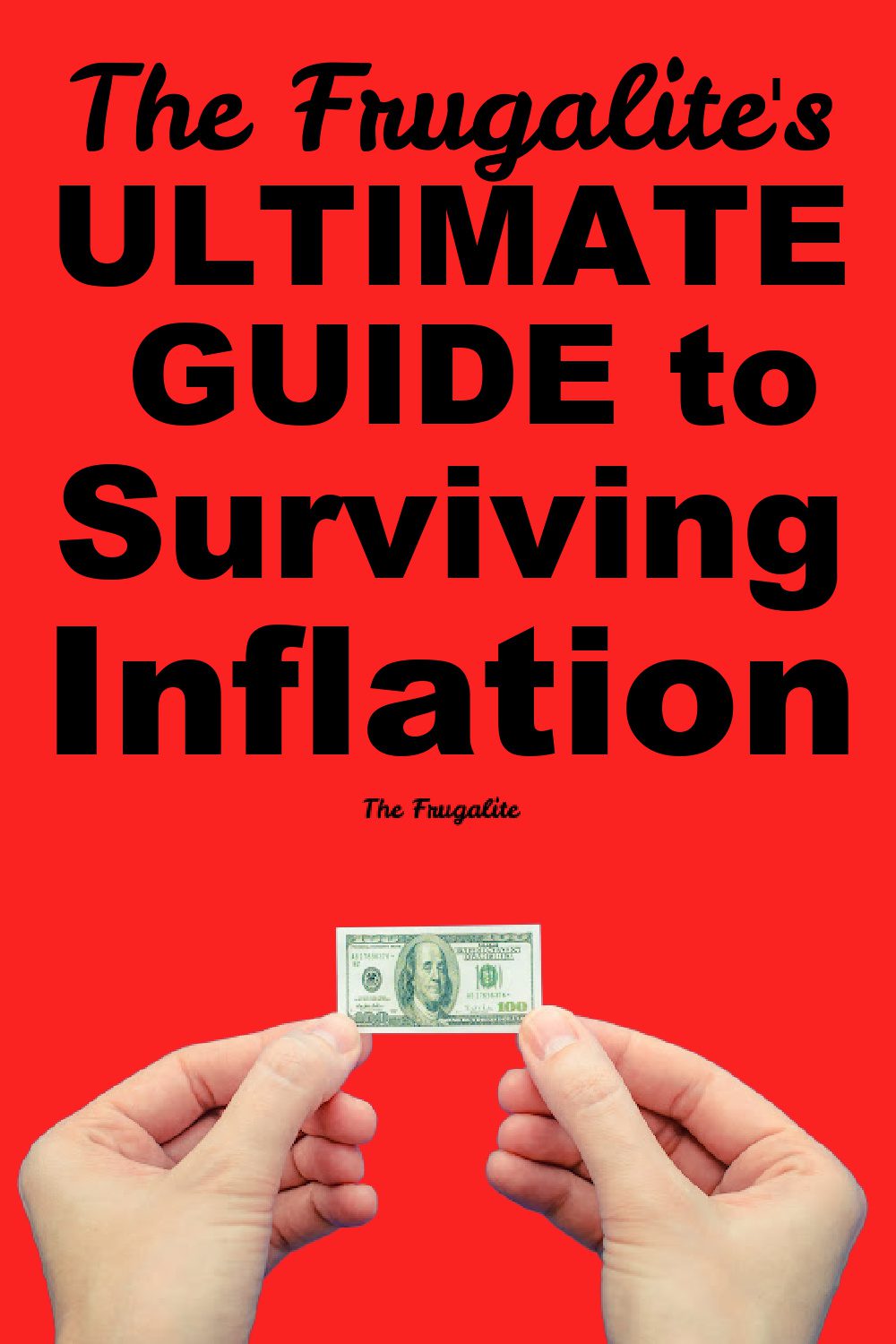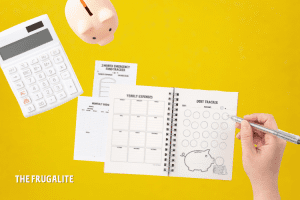(Psst: The FTC wants me to remind you that this website contains affiliate links. That means if you make a purchase from a link you click on, I might receive a small commission. This does not increase the price you’ll pay for that item nor does it decrease the awesomeness of the item. ~ Daisy)
by the author of The Ultimate Guide to Frugal Living
and The Flat Broke Cookbook
It’s pretty tough to set a budget and stick to it when prices are increasing by almost 10% in a month. You read that right. The Bureau of Labor Statistics revealed that prices increased by 9.1% during the month of June 2022, and this unfortunate trend shows no sign of slowing down.
This is a catastrophic level of inflation, and it has a lot of Frugalites scratching their heads, wondering how on earth to survive it. I wish I could provide a simple formula that says, “Take these steps, and you’ll be just fine.” But that would be unrealistic.
The fact is, some of us will not be just fine. We will not come out of this unscathed. We have to just do what we can to limit the damage. This is especially true if your budget was tight before. While you have the advantage of being a frugal-living pro, there is also simple math that says the increased prices of food, gasoline, utilities, and other essentials are going to hit you harder than those who have a bit more disposable income.
But…we are not the type of people who just give up. We know that we can get through hard times. Here are some ways to stretch your money with associated links in case you want to learn more about them. All of these suggestions will not be appropriate for all people. So take what you can and leave what won’t work for you.
1.) Revisit your fixed expenses.
First things first, take a look at your fixed expenses. These are the payments that come out of your account regularly, and they are a set price. You may be able to reduce or eliminate some of these expenses and free up some money for the ever-rising essentials.
Some examples of fixed expenses are rent/mortgage, car payment, insurance, cable, phone bills, and extracurricular activities. To learn more about reducing these expenses, check out this article.
2.) Consider a different living situation.
This one is a tough cut to make for many people. However, changing your living situation can result in enormous savings or a significant amount of additional money in the budget.
Some examples might be:
- Combining households with another family.
- Renting a room or space in your home.
- Relocating to a less expensive home. (Be careful with this one – moving costs could eat up any savings.)
There’s a lot to think about before making a change like this. Consider things like safety, accessibility to school and work, transportation, and costs associated with making the change.
3.) Build a stockpile.
As many of you know, I’m also a prepper. That means, if you are unfamiliar, that I’ve been stocking up on things for quite some time in case of an emergency. I buy things on sale, such as shelf-stable food, health and beauty aids, and consumable supplies, and store them carefully for when they’re needed. Don’t think that a stockpile just means food. I have stashed shampoo, toothpaste, school supplies, and much more over the years.
An emergency doesn’t have to mean a nuclear strike or a natural disaster. It can be as simple as too much month and not enough money. Many of us know just how true of an emergency the latter situation is.
These resources can help you build a stockpile.
- How To Eat For a Week From Your Pantry and $20
- The Pantry Essentials You Need for Scratch Cooking
- Build a Better Pantry on a Budget
- A Crash Course in Pantry Economics
- Prepper’s Pantry
- The Top 50 Non-Food Stockpile Essentials
Even now, with prices skyrocketing, you can work toward putting some things back. While the back-to-school sales this year aren’t as good as in previous years, you can still get sheaves of notebook paper for less than 60 cents, along with other necessary supplies. You can still stumble across a loss leader at the grocery store or a last-day-of-sale motherlode that you can preserve for your pantry. Be on the lookout for good deals and stock up as you can.
4.) Don’t drive as much.
This is a major lifestyle change for many people. But with the astronomical cost of fuel, driving as a pastime is no longer reasonable for those on a budget. I used to pick up my daughter and go on a long drive on a sunny weekend just to see the scenery, but that is no longer a viable option.

Now, since I work from home, I try to only drive once or twice per week. I keep a running list of the errands that need to be run so that I can group them together. I walk whenever possible. This saves me quite a lot of money since I drive a Jeep, and it’s nearly a hundred bucks to fill my tank. I’ve gotten to the point where I’m only filling up once a month instead of every ten days or so, and at these prices, that provides for the increase in grocery prices.
This article has more tips on coping with high fuel prices.
5.) Be economical with your food.
Make the most of your food budget by using a wide variety of strategies.
- Don’t let anything go to waste – eat your leftovers! Here are some ways to make leftovers as enticing as the initial meal.
- Add some dirt cheap meals to your recipe repertoire to make your grocery budget stretch.
- Meal prep so that you have food ready when you need it and reduce the temptation to go through a drive-through on the way home from work.
- Stretch meat with these tips.
- Don’t let picky eaters derail your frugal efforts.
You have to take very deliberate steps to make your food go further, and it’s important to make sure that the tips you choose to adopt are ones that your family will not rebel against.
6.) Be thrifty with utilities.
Utilities are something over which we have a little bit of control. There are things that you can do to consume less electricity, natural gas, and water without too much difficulty.
- Keep the thermostat at a reasonable temperature. I have to confess, I absolutely love sleeping in a chilly room. If I had my way (and unlimited money), my air conditioning would be set at 62 degrees at night in the summer, and the windows would be wide open in the winter. BUT – that’s an outrageous expense, so I adapt. Here are some tips for keeping cool in the summer and staying warm in the winter.
- Be conservative with water use. Shorten your showers, use rainwater for outdoor plants whenever possible, and reuse washing up kitchen water for your garden. Here are some more water conservation tips.
- Hang your laundry. Whether on a clothesline outdoors or on a rack in the bathtub, air-drying your wash can make an enormous difference in your utility bills. As well, it can help keep the ambient temperature in your house more comfortable.
Here are some more excellent tips on reducing your utility usage.
7.) Keep a good attitude.
If you go into this feeling as though it’s torture and you’re really hard-done-by, you’re going to be miserable, and your efforts will seem far more difficult. If you can face this as an exciting challenge, a game you can win, you’ll be far more successful and a whole lot happier. And don’t forget to be grateful, no matter what comes your way.
How are you handling inflation?
Is inflation hitting home for you? Are there some strategies you are using that you find helpful? Share how you are surviving inflation in the comments. You just might inspire someone else who is going through a rough time.
About Daisy
Daisy Luther is a coffee-swigging, adventure-seeking, globe-trotting blogger. She is the founder and publisher of three websites. 1) The Organic Prepper, which is about current events, preparedness, self-reliance, and the pursuit of liberty; 2) The Frugalite, a website with thrifty tips and solutions to help people get a handle on their personal finances without feeling deprived; and 3) PreppersDailyNews.com, an aggregate site where you can find links to all the most important news for those who wish to be prepared. Her work is widely republished across alternative media and she has appeared in many interviews.
Daisy is the best-selling author of 5 traditionally published books, 12 self-published books, and runs a small digital publishing company with PDF guides, printables, and courses at SelfRelianceand Survival.com You can find her on Facebook, Pinterest, Gab, MeWe, Parler, Instagram, and Twitter.













12 thoughts on “The Frugalite’s Ultimate Guide to Surviving Inflation”
Up until the late 1930s when rural electrification came into being, lots of people would heat water for cooking, bathing, washing clothes, etc in double length boiler tubs long enough to fit over two burners on their wood-fired or kerosene burner kitchen stoves. [I have two such inherited tubs.] They didn’t pay a utility company to heat their water. Today there are multiple ways to heat water without paying a separate utility bill for it. And while everyone’s circumstances are different, taking a sponge bath uses much less hot water than showering.
Relying on the Bureau of Labor Statistics (BLS) is another government way to deceive you. Whenever government wants to minimize the latest BLS numbers, they change what products are included in the index. While such a dishonest scam has long been used to minimize the payout for Social Security checks, we should expect even more statistical treachery as inflation goes through the roof.
It helps to understand that if only a few products or industries are affected by price increases, then the causes are usually nature-related, supply shortages, etc having nothing to do with government. But when prices pretty much across the board are going way up, it’s generally government/central banking counterfeiting the money supply in order to steal purchasing power from the population. And of course the lamestream media would be terrified @#$%-less to honestly label that process as criminal theft of purchasing power from the population.
There is a many thousands year history of governments debasing their money to feed a never ending appetite for warfare / welfare / anything else-ware, but the modern era began when the Bank of England was created in the 1690s for the specific purpose of stealing purchasing power from the population in a way that the vast majority would never understand. Previously when an English King had piled on extra taxes to the existing tax bill to fund his favorite wars, the population rebelled and the King was beheaded.
Another history lesson was that such central banks jealously guarded their counterfeiting monopoly so that they alone could steal purchasing power from the people. One example of this was when Benjamin Franklin disclosed to the British parliament that the American colonists had created their own money to do business (because England was neglecting such legitimate needs), the British parliament immediately banned the colonists’ locally created money. That caused a deep depression — which was another strong motivation for our American Revolution.
After that war, memories were painfully fresh about the near starvation during that war regarding horrific over-printing of the Continental currency. The result was that in 1792 the new Coinage Act mandated silver for the nation’s coins and a death penalty for anyone violating that silver mandate. The supply of silver was so scarce that Martha Washington donated her personal silver service so it could be melted down for the nation’s first issue of some 1,500 silver coins. There were those who said that the image of Lady Liberty on those coins looked remarkably like Martha Washington.
Today with virtually no history of counterfeiting restraint on the Federal Reserve (judging by the inflation from the World Wars, Korea, Vietnam, etc, etc), the spendaholics during the Biden administration have cranked up the purchasing power theft process enormously. The result is that saving as much of your holdings in US dollars (excepting the mandatory minimum amounts for required monthly basics, for example) is a losing strategy guaranteed to feed the central banking monster’s bottomless appetite.
So how can one preserve one’s purchasing power given this assault on the US dollar?
In past centuries barter has often been used despite its limitations and awkwardnesses. Such products as grains, alcohol, chocolate, salt, etc are just part of that history. Today the creation of the blockchain mathematics has made possible an incredible variety of crypto-currencies — some honest and some incredibly shaky. As as could be expected, the US SEC is looking at ways to “regulate” non-government issued cryptos — likely in ways to tax and oppress them to make them non-competitive to the expected government issue of digital money.
Only in the last few days there has been some news about some incredible high end math that is allegedly capable of breaking the blockchain process. Whether there is any substance to such a claim remains to be learned, but is worth monitoring.
Another alternative money system was devised by a UK-based company that issues charge cards for your purchase amounts of gold bullion in vault storage in Switzerland. Only in the last few years has glintpay.com extended that service to America when they introduced it to this country at the International Boat Show in Ft. Lauderdale, FL. That was before the news hit the wires about the globalist push for a cashless economy. It is unclear how, or if, glintpay.com can operate side by side in such a cashless economy — especially with gold backing that governments and central bankers can’t counterfeit — which they despise.
So possible stores of purchasing power value in the face of criminal government / central banking counterfeiting might include:
1. barterable assets.
2. selected crypto currencies (with the caveats about blockchain-breaking math, and government oppression/taxation/regulation of such competition)
3. glintpay.com account — despite the uncertainties discussed above
Other stores of value might include:
4. your personal skill set for which you can set and adjust their market prices as inflation skyrockets.
5. investment in companies with a value profile likely to increase rapidly enough to outrun inflation.
6. Tools, properties, or even animals that either you can use for your personal skills, or that you can rent to others even with rapidly inflating prices.You could even use this category to include leasing out people to customers depending on what markets and their skill sets you might understand.
–Lewis
Amazing historical and economic rundown! Today’s state of affairs has been in the making for God knows how long…
Thanks for sharing.
A couple of other stores of value:
* family, friendship and community allies (if you have)
* biblical wisdom, experiental faith, knowledge of prophetic final events
Last August I did May annual stock-up of canned soups which I always did to provide a quick meal for my husband and myself when they put soup on sale at a good price. Campbell Chunky 4/$5 and Progresso $.99 a can. I bought my usual large quantities of the varieties we liked best. Then in early September my husband went into a memory care center. His neurologist told my family that I was worn out. That reduced the need for soup. I also found some great deals on dehydrated soup during the same period (I would cook 2 or more quarts and freeze all but one or two meals. The soup reserve is great, and the price at the store has doubled. Probably one of my best investments.
A clarification to the 9.1% – not 9.1% since last month but since a year ago. While increased price of anything hits the lower class more than others, it is unrealistic to expect prices to never go up. All too many have cut out luxuries/”wants” and income barely covers needs/necessities. IF you qualify for assistance of any type, time to apply for it. Your kids and/or you going hungry isn’t going to get you a trophy for never receiving help.
Unfortunately, interest rates were too low for way too long. The average American did not benefit like corporations/the wealthy. While ceilings exist on the maximum interest rate for credit cards, HELOCs, so do floors.
Fuel is a killer for most – IMHO one’s most potent weapon is decreased consumption – aka demand. We’ve all been thru high gasoline/diesel prices before.
Things will settle down, we’ve been through high inflation/recession/Great Recession and for even fewer folks, the Great Depression.
Yes, one can consume less in utilities but the fixed rate of gas/electric won’t change. In some states, gas/electric cannot be shut off during certain times of the year (aka winter). Not saying you should skip paying your bill but if your state has this law, it might give you one less worry during the winter. My natural gas company used to have what I called a true budget plan. Pay x amount per month based on consumption from a specific month last year to same month this year. Now they “adjust” the “budget” amount every quarter. I no longer use the budget plan. I used it for 15 years and only one time did I not have enough “banked up” to cover the final month of the annual period. Price per therm hit almost $1.00 the last 2-3 months of the annual period.
Thank you, Selena. We don’t agree on much, but your definition of the inflation rate is correct.
One thing I would suggest is if at all possible, try to find work at a place that allows work from home. There are more and more companies who do that including big corporations with thousands of employees. I am extremely grateful to still be working from home, my company decided to get rid of a lot of their buildings in response to inflation, simultaneously saving themselves money and also saving their employees a lot of employment related costs. I’m glad they did that because it’s probably saving me a couple hundred a month. It may not be for everyone, but for anyone with a ghost of a chance, it’s worth a look.
I couldn’t agree more re: telecommuting. I’ve been telecommuting since 2011. Not only saves fuel but clothing and other “stuff” required to meet dress code (or as anyone in corp america knows, things that affect performance review whether work specific or not). Less wear and tear on vehicle, less preventative maintenance, new tires, etc.
Saw a news article the other day that some (not all) would rather be able to telecommute than get a raise. I was hired as a telecommuter so no change for me during COVID-19. But I know back-2-the-office is a bone of contention for some workers. My employer expanded hybrid (home x days, office x days). Probably figured out they’d save on cubicle costs but given the tight labor market (I’ll stay off my soapbox), wised up to the cost of replacing employees.
One thing that most people overlooked prior to the current (and near future) financial mess is their own personal finances. I highly recommend Dave Ramsey (“Total Money Makeover”) as a must read for how to build a resilient financial shell around yourselves. Check your local library. First set aside $1000 as a “baby” emergency fund. Next list all your bills from smallest to largest (car loan, credit cards, student loans, etc.). Make minimum payments on all but the smallest. Throw everything you’ve got at the smallest and pay it off. Then move on the the next debt and so on until you only owe on your mortgage. Now build up the emergency fund to 3-6 months of living expenses (food, utilities, rent/mortgage payments). Notice that you no longer have a car payment? If self-employed like I was, my emergency fund was 1 year’s expenses that included property taxes and a contingency for additional income taxes. Now start saving and investing for retirement. Don’t forget worthwhile local charities like Blessings In A Backpack (our favorite) that provides food for the weekend for kids that get subsidized / free meals at school.How about donations to your local food bank? Look around you. There is always someone who is worse off than you are that could use your help.
While I have a copy of “Total Money Makeover” I have a long-standing disagreement with Dave Ramsey about the best way to pay down debts. He recommends to pick the smallest debt first, pay it off, and then work on the next smallest debt and so on. The problem is that while you get a little emotional boost for that process, you are not paying off things in the fastest way possible. To do that … choose the debt first with the highest interest rate and pay it down first. Then work on the debt with the next highest interest rate and so on. You won’t get the same emotional kick from that approach but you will pay down the total debts faster and more economically than the Ramsey method.
There is a lesson from monetary history that hints at what hyperinflation could do to change the game when paying down debt. In 1933 when FDR criminally confiscated most gold holdings of citizens in the US, he excepted collector value gold coins owned by his ultra-wealthy financial supporters as well as gold that was owned and held in other countries. The idea was to steal from the little people (before marking it up from $20/oz to $35/oz) but not from his Wall Street and oligarch class financial supporters.
The book “The Gold Clause” (copyright 1980, 2000) by Henry Mark Holzer ( a law professor at Brooklyn Law School) tells how private lenders who could no longer rely on gold-backed money to pay back their loans for houses, businesses, etc shut down. That left the government a monopoly to be created (like Fannie Mae and Freddie Mac) in such lending.
All debts only make sense when being agreed upon if the purchasing power in the designated currency is being reasonably preserved by that money’s creator. But in the case of a government or central bank created currency that is being rapidly counterfeited, that purchasing power is being stolen and transferred to the money creator’s closest oligarch financial buddies. The result is that debt holders would get paid down by increasingly worthless money … with no contractual way to demand any increase in payments to compensate for the increasingly worthless currency. One result is that when hyperinflation looks imminent, private lenders bail out of that market immediately for any new loans.
It’s not hard to figure out if debts you owe have to be paid off with currency that is being rapid hyper-inflated. Do you have the ability to raise the price of your services to keep your earnings at least in line with such increases? Have you been planning on saving enough cash to handle those debts? Can you visualize what conditions could guarantee that you couldn’t possibly pay off such debt?
–Lewis
To tell you the truth, I have been frugal my whole life, so I have not really felt a change in my standard of living. I’m 72, want for nothing, and have never been extravagant (well, I do own a sapphire ring ahem). This is always the way I have lived:
1. Clothing. I buy the best I can afford, take care of it, and wear it until I cannot get another use. I am stylish in a casual way and people remark on how pretty my clothes are. I smile, say thanks, and don’t mention that they are at least 10 years old.
2. Food. I have a wonderful pantry and I only buy loss leaders at the store to supplement my diet. I garden. I only buy milk and fresh fruit on a regular basis. Another thing I do is not over eat. I portion my food and that is it.
3. Gas. My car is paid off and I keep the oil changed regularly. I drive a 2014 Kia and it serves me well. I use about one tank a week since I live in the country. Yes, my gas price has doubled, but if I’m careful, the cost is covered by frugality. My thermostat is set at 78 in the summer and 65 in the winter. I only do 2 loads of wash a week.
4, Home. The secret to a lovely, comfortable home is to only have things you love. You will not be wanting to change furniture or curtains, or decor if you do that.
If you take care of what you have, chances are your things will take care of you.
Another great article Daisy. But you neglected to mention vote Republican. Price inflation is not caused just by Biden’s trillions of dollars of monetary inflation to stimulate the economy and create green jobs. Both ideas of which are complete nonsense. It is caused by his deliberate destruction of America’s energy independence and the deliberate encouragement of millions of illegals to flood across the border. How many billions of dollars of taxes will be needed take care of these illegals while at the same time they tell us your social security and medicare is running out. Everything the democrat party is doing is intended to destroy the economy of the United States. And the mainstream media is complicit. The msm is nothing more than the propaganda arm of the democrat party. And the democrat party is controlled by their globalist puppet masters. What’s the end goal? Klaus Schwab the leader of the World Economic Forum/Globalist headquarters actually tells us their goal which is to create a world where he says “You will own nothing and you will be happy.” This can only happen after the democrat party completely destroys the economy of the United States and then lo and behold Klaus’s solution to the problem they created is presented. Look up Hegel’s Problem-Reaction-Solution strategy if you want to know what the globalists main strategy for conquest is.
See the below speech by that serial liar Joe Biden where his ideas for improving the economy are price controls “The cap”, “ clean energy”, the Federal Reserve raising interest rates, raising taxes on corporations and more government bureaucrats meddling in supply chain problems. We don’t need more useless bureaucrat clowns like Pete Buttigieg and Kamala Harris helping to make sure “the manufacturer has access to all the materials they need to build a product.”. Free markets can do that much better than government bureaucrat clowns. And as you might already suspect the Federal Reserve raising interest rates cannot prevent the price inflation caused by the money supply being expanded by trillions of dollars. That has to be the most blatant lie in Biden’s speech.
Anyone still voting democrat after reading this post has no one to blame for price inflation but their msm brainwashed self.
Remarks By President Biden on the Economy
May 10, 2022
https://www.whitehouse.gov/briefing-room/speeches-remarks/2022/05/10/remarks-by-president-biden-on-the-economy-5/
I didn’t make that suggestion because this is not a political website. Our only goal is to help people with their personal finances, regardless of political leanings. 🙂